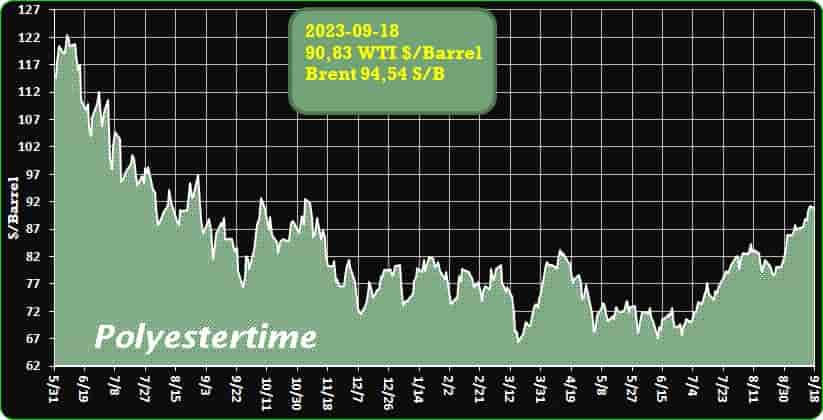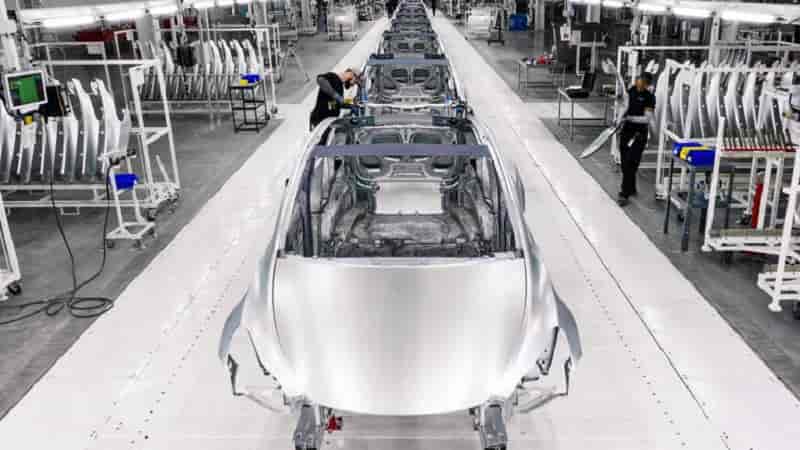Fossil fuel peak – Electric Vehicles: A Solution for Faster Charging and Longer-Lasting Batteries 18-09-2023
Fossil fuel peak
Petrochemicals Polymers – M. Holland Unveils Mfinity Line of Sustainable Resins

Crude Oil Prices Trend

Crude Oil Prices Trend by Polyestertime
The expansion of renewable energy sources brings the fossil fuel peak within reach
The International Energy Agency (IEA) has revealed that the era of constant growth in fossil fuels is approaching its end within this decade, marking a significant shift in the global energy landscape and the fight against climate change. In an article published in the Financial Times, IEA director Fatih Birol highlights the implications of this transition.
Despite previous discussions about peak oil and peak coal, both fossil fuels have recently reached record highs in production, making it challenging to predict their decline. However, the IEA’s upcoming World Energy Outlook report, set to be released next month, indicates that we stand at the brink of a pivotal moment in history.
Even without the implementation of new climate policies, the report suggests that each of the three major fossil fuels—oil, coal, and natural gas—is poised to reach its peak demand in the coming years. This development is a significant departure from previous expectations and is largely attributed to the remarkable growth of clean energy technologies like solar panels and electric vehicles, structural changes in China’s economy, and the consequences of the global energy crisis. Fossil fuel peak
Global coal demand, which has remained stubbornly high for the past decade, is projected to peak in the near future. Investments in coal outside of China have dwindled, with solar and wind power dominating the expansion of electricity systems. Even in China, the world’s largest coal consumer, renewable and nuclear energy growth, coupled with a slower economy, indicates a decline in coal usage.
There had been speculations that global oil demand might have already peaked during the pandemic. While the IEA was initially cautious about such claims, the latest projections suggest that the proliferation of electric vehicles worldwide, especially in China, is steering oil demand toward a peak before 2030.
The “Golden Age of Gas,” as it was termed in 2011, is also approaching its end. Demand in advanced economies is expected to diminish later in this decade as renewables increasingly outcompete gas for electricity production, heat pumps gain popularity, and Europe accelerates its transition away from gas due to geopolitical factors.
While the forthcoming peaks in demand for fossil fuels are promising, it’s essential to consider several key factors. Firstly, the projected declines in demand, based on current policy settings, are insufficient to align the world with the goal of limiting global warming to 1.5°C. Achieving this target will necessitate more robust and rapid policy actions by governments.Fossil fuel peak
Additionally, the drop in fossil fuel consumption in advanced economies will be partially offset by continued growth in some emerging and developing economies, particularly for natural gas. The declines in demand won’t follow a linear trajectory, as temporary fluctuations, such as heatwaves and droughts affecting electricity generation, can lead to spikes in coal demand.
While the peaks in demand based on current policies don’t eliminate the need for investment in oil and gas supply, they underscore the economic and financial risks associated with major new projects in these sectors.
In conclusion, the IEA’s projections indicate a historic turning point in the energy sector, but they emphasize the urgent need for more substantial policy measures to combat climate change effectively.Fossil fuel peak

Electric Vehicles: A Solution for Faster Charging and Longer-Lasting Batteries
A team of researchers from the University of Pisa has found a way to improve the charging speed and lifespan of electric vehicle batteries. Their findings, published in the journal Nature Communications, could revolutionize the electric vehicle industry.
The main problem with current lithium-ion batteries is that they can degrade over time, leading to shorter range and slower charging speeds. This is due to a phenomenon called lithium plating, which occurs when lithium ions build up on the surface of the battery’s negative electrode.
The researchers from the University of Pisa found that lithium plating can be prevented by inserting pauses during the charging process. These pauses allow the lithium ions to redistribute themselves within the battery, preventing them from building up on the surface. Fossil fuel peak
The researchers also found that the pauses can be made very short, without significantly impacting the overall charging time. This means that electric vehicles could be charged quickly and safely, without sacrificing battery life.
The findings of this study are a major breakthrough for the electric vehicle industry. They could lead to the development of new battery technologies that are faster, safer, and more durable. This could make electric vehicles more appealing to consumers and accelerate the transition to a clean energy future.
In addition to the benefits of faster charging and longer battery life, the new technology could also help to reduce the risk of fires and explosions. Lithium plating is a major cause of these incidents, so preventing it could make electric vehicles much safer.
The research from the University of Pisa is still in its early stages, but it has the potential to revolutionize the electric vehicle industry. If the technology can be successfully commercialized, it could make electric vehicles a more viable option for consumers and businesses. Fossil fuel peak
This is a major step forward for the electric vehicle industry, and it could have a significant impact on the future of transportation. With faster charging and longer battery life, electric vehicles will become more appealing to consumers and businesses, and they could help to reduce our reliance on fossil fuels.

Repsol launches EVA range with 100% chemically recycled content
Repsol, the Spanish petrochemical company, has launched a range of ethylene vinyl acetate (EVA) copolymers made with 100% chemically recycled content. This is the first product on the market to incorporate this level of circular AV from chemical recycling.
The new EVA range is part of Repsol’s Reciclex portfolio, which encompasses both polyolefins and polyols obtained through chemical recycling, using plastic waste streams that cannot be mechanically recycled. The range is certified under the ISCC Plus mass balance approach.
Repsol says that the new EVA range is especially relevant for applications that cannot use mechanical recycling due to the properties required by the final product. For example, it can be used in food contact products, cosmetics, and healthcare products.
The company is also set to soon include polyol obtained through the chemical recycling of polyurethane waste in its Reciclex range.Fossil fuel peak
Repsol is building a new polyurethane foam recovery plant in Puertollano, Spain, which is expected to be operational in 2023.
Repsol’s investment in chemical recycling is in line with recent European and Spanish regulations, which are aimed at achieving a recycled content target of 30% for plastic packaging by 2030.
In simpler words:
Repsol has launched a new type of plastic made from recycled plastic waste. This is the first plastic of its kind to use 100% recycled content. The new plastic can be used to make a variety of products, including food packaging, cosmetics, and medical devices.
Repsol’s investment in chemical recycling is helping to reduce the amount of plastic waste that goes to landfills. It is also helping to meet European and Spanish regulations on recycled content in plastic packaging.Fossil fuel peak

Enviro and Siemens signs MOU regarding cooperation around the European expansion plan
Munich, Germany – Scandinavian Enviro Systems and Siemens has signed a MOU, memorandum of understanding, regarding a collaboration in support of the European expansion plan that Enviro announced earlier this year together with Antin Infrastructure Partners. Through the collaboration, Enviro gets access to Siemens’ extensive experience in automation and digitalization for efficient industrial production.
The MOU was signed in connection with Siemens’ now ongoing Siemens NordX Circle seminar, focusing on sustainability and digitalization, where Enviro’s CEO Thomas Sörensson is one of the speakers. A number of international business leaders participate in the seminar, including Siemens’ sustainability manager Judith Wiese, who is the seminar’s keynote speaker. Fossil fuel peak
Together with Antin Infrastructure Partners, and with the support of Michelin, Enviro has formed the world’s first large-scale tire recycling company and with the plan to establish recycling facilities in Europe by 2030 with a total annual recycling capacity of 1 million tons of end-of-life tires. Siemens is already today a supplier of both hardware and software to the tire industry and, with its focus on sustainability and digitalization, has a great interest in supporting Enviro during the upcoming phase of broad industrialization.
“With the formation of the tire recycling joint venture company, Enviro has acquired the right industrial structure and the right partner company to be able to seriously take part in the transformation of the tire industry towards increased sustainability.
As a supplier and partner, Siemens wants to support the new tire recycling company and thereby help accelerate the important journey towards increased sustainability,” says Maria Grahm, Business Unit Manager Process Automation at Siemens Digital Industries.
Fossil fuel peak

Tesla’s Quiet Breakthrough in Carmaking
Tesla has made a technological breakthrough that could transform the way it makes electric vehicles (EVs). The company has developed a new way to cast the underbody of an EV in a single piece, rather than the hundreds of parts that are typically used in a conventional car. This could help Tesla to halve the production costs of its EVs and make them more affordable.
The new casting process uses huge presses with 6,000 to 9,000 tons of clamping pressure. This allows Tesla to create a single, strong and lightweight underbody for its EVs. The company is also using 3D printing technology to create the sand molds for the casting process, which is more cost-effective and allows for rapid design iterations.
Tesla is still in the early stages of developing this new casting process, but it is expected to be used in the company’s upcoming small EV, which is aiming to have a price tag of $25,000. Fossil fuel peak
If successful, this new process could revolutionize the way EVs are made and make them more accessible to a wider range of people.
Here are some of the key benefits of Tesla’s new casting process:
- It can reduce production costs by up to 50%.
- It can make EVs lighter and more efficient.
- It can shorten the design and manufacturing process.
- It can improve the crashworthiness of EVs.
Tesla is not the only automaker that is working on new casting processes for EVs. Other companies, such as Ford and BMW, are also developing similar technologies. However, Tesla is believed to be the furthest ahead in this area.
If Tesla is able to successfully commercialize its new casting process, it could have a major impact on the EV industry.
It could help to make EVs more affordable and accessible, and it could also lead to the development of new and more efficient EV designs. Fossil fuel peak

Sidel Introduces EvoBLOW XL, a Cutting-Edge Blowing Machine for Large PET Containers
Introduction: Sidel, a leader in packaging and blowing solutions, proudly presents its latest innovation, the EvoBLOW XL machine. This state-of-the-art technology is designed to cater to the growing demand for large PET containers while maintaining performance and sustainability. EvoBLOW XL is set to revolutionize the packaging industry by offering versatility, efficiency, and sustainability.
Key Features and Benefits:
- 75% Shared Parts: EvoBLOW XL leverages Sidel’s existing EvoBLOW range by sharing 75% of its components. This demonstrates Sidel’s commitment to proven performance while expanding into new markets, including hotfill products.
- Versatility: EvoBLOW XL serves as both a standalone machine and an integrated combi solution, accommodating a wide range of bottle formats from 8L to 10L.
- It offers flexible oven configurations and various bottleneck dimensions, making it adaptable for diverse large bottle types. Fossil fuel peak
- Efficiency: With an impressive blowing output of 18,000 bottles per hour (bph) and an overall equipment effectiveness (OEE) of 98%, EvoBLOW XL sets a new standard for production efficiency. It boasts user-friendly features for efficient changeovers, including an ergonomic embedded mold handling tool and a mobile mold storage unit.
- Sustainability: EvoBLOW XL is designed to handle rPET grades, offering sustainability benefits from virgin PET to up to 100% rPET. It enables lightweighting, reduces CO2 emissions, and supports the transition from HDPE to PET large bottles. The machine’s design enhancements contribute to reduced energy consumption without compromising cost-effectiveness.
- Bottle Design: EvoBLOW XL enhances the blowing process, ensuring attractive and user-friendly bottle designs. It achieves perfect material distribution at speeds of 1,500 bph per mold while maintaining low blowing pressure and the highest bottle quality. Fossil fuel peak
Coverage by Packaging South Asia: Packaging South Asia, a prominent B2B publication and digital platform based in New Delhi, India, closely monitors the growth and impact of responsible packaging in the region. It highlights the packaging industry’s consistent outperformance compared to GDP growth, even amid challenges like supply chain disruptions and fluctuating raw material prices.
The publication covers the entire packaging supply chain, making it a valuable resource for brand owners, product managers, raw material suppliers, packaging designers, converters, and recyclers. With significant growth opportunities in the packaging industry in India and Asia, now is the ideal time to engage with Packaging South Asia’s influential platform for targeted business communication. Fossil fuel peak
Contact Information:
- For advertising inquiries, contact: ads1@ippgroup.in
- For editorial inquiries, contact: info@ippgroup.in
- For subscriptions, contact: subscription@ippgroup.in

The Nickel-Hydrogen Battery: A 30-Year Revolution in Energy Storage
Space exploration has long been a source of inspiration and innovation, leading to groundbreaking developments that have found their way into our everyday lives. One such remarkable advancement is the nickel-hydrogen battery, which not only defies the limitations of traditional batteries but also boasts an astonishing lifespan of 30 years and 30,000 charging cycles. This exceptional technology, originally designed by NASA to power space missions, is now poised to revolutionize energy storage on Earth, thanks to the pioneering efforts of American company EnerVenue.
EnerVenue, an innovative American company, is taking a giant leap forward in the battery industry by harnessing the engineering and chemistry expertise honed by NASA over four decades. The genesis of this technology traces back to its application in the power systems of the International Space Station and the Hubble Space Telescope. As EnerVenue prepares to scale up production, these nickel-hydrogen batteries are poised to replace conventional batteries, bringing with them numerous advantages that have the potential to reshape how we power our world. Fossil fuel peak
The nickel-hydrogen batteries developed by NASA for space missions have been meticulously engineered to endure the harshest conditions imaginable, from the vacuum of space to rapid temperature fluctuations. These batteries have proven their mettle as safe, durable, and recyclable energy storage solutions, while also eliminating the risks associated with fires and toxic waste. Their remarkable performance in space missions serves as a testament to their reliability and longevity.
EnerVenue’s commitment to harnessing this groundbreaking technology is evident in its recent announcement of the construction of a Gigafactory in the United States. This ambitious venture represents a pivotal moment in the energy storage industry, where space technology is set to transform the way we store and utilize power in our daily lives. Let’s delve deeper into the key attributes of nickel-hydrogen batteries and how EnerVenue’s vision could impact our future. Fossil fuel peak
The Resilience of Nickel-Hydrogen Batteries
Nickel-hydrogen batteries are engineered to thrive in the extreme conditions of outer space. Unlike traditional batteries that struggle with rapid temperature fluctuations, these batteries remain unfazed, providing a stable and reliable power source for critical space missions. The vacuum of space, with its extreme cold and intense radiation, poses significant challenges to energy storage, but nickel-hydrogen batteries have repeatedly demonstrated their ability to withstand such conditions.
Unmatched Longevity
One of the most remarkable features of nickel-hydrogen batteries is their longevity. These batteries are built to last for an astonishing 30 years, significantly outperforming conventional lithium-ion batteries, which typically have a much shorter lifespan. Moreover, they can endure a staggering 30,000 charging cycles without a significant degradation in performance. Fossil fuel peak
This exceptional durability reduces the frequency of replacements, leading to cost savings and a more sustainable approach to energy storage.
Safety and Sustainability
Safety and sustainability are paramount considerations in energy storage solutions, and nickel-hydrogen batteries excel in both areas. Unlike some conventional batteries that carry the risk of catching fire or generating toxic waste, nickel-hydrogen batteries pose minimal environmental and safety hazards. They are non-toxic, non-flammable, and fully recyclable, making them a responsible choice for a world increasingly concerned about environmental impact. Fossil fuel peak
EnerVenue’s Vision for a Battery Revolution
EnerVenue’s mission to bring the benefits of nickel-hydrogen batteries to Earth is a bold and visionary endeavor. By establishing a Gigafactory in the United States, the company is poised to accelerate the production and adoption of this transformative technology. This move signals a paradigm shift in how we approach energy storage, with space technology at the forefront of innovation.
The Gigafactory will not only boost production capacity but also create jobs, stimulate economic growth, and reduce our reliance on traditional energy sources.
As the demand for sustainable energy solutions continues to rise, EnerVenue’s nickel-hydrogen batteries offer a compelling alternative that aligns with our commitment to a greener future.Fossil fuel peak
In conclusion, the nickel-hydrogen battery, born out of the rigors of space exploration, represents a remarkable leap forward in energy storage technology.
With its unrivaled resilience, longevity, safety, and sustainability, it has the potential to transform the way we power our world. EnerVenue’s ambitious plans to manufacture these batteries at scale in the United States mark a pivotal moment in our quest for cleaner, more reliable energy storage solutions.
As we look to the future, it is clear that space technology will continue to play a pivotal role in improving our daily lives and advancing our society towards a more sustainable and innovative future. Fossil fuel peak

Fossil fuel peak
